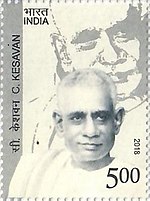About C. Kesavan
- C.
- Kesavan (23 May 1891 – 7 July 1969) was the Chief Minister of Travancore-Cochin during 1950–1952.He was born in 1891 in the village of Mayyanad, near Kollam in the then princely state of Travancore.
- For some time he worked as a teacher and then took a law degree from Thiruvananthapuram and started practice in Kollam. Kesavan was influenced by the work of Padmanabhan Palpu, the social reform campaigner who was a member of the backward Ezhava community and a founder of the Sree Narayana Dharma Paripalana association where he later rose to the general secretary post.
- He became an activist for the Ezhava caste, seeking an improved socio-economic position for them, and in the 1930s he suggested that they should abandon Hinduism.
- Thus he was an atheist.
- C.
- Kesavan was influenced by the teachings of Sree Narayana Guru, Gandhiji and Karl Marx.
- He worked for temperance and eradication of untouchability and served as General Secretary of SNDP Yogam. From 1933, C.
- Kesavan was one of the prominent leaders of Abstention movement or Nivarthana Prakshobham in Travancore of present day Kerala.
- Because of a speech he made at a public meeting in Kozhencherry he was arrested on June 7, 1935, tried for sedition, and sentenced to two years imprisonment.
- In Kesavan took an active part in organizing Travancore State Congress and became a member of its working Committee.
- During the agitation for responsible government in Travancore, he was arrested several times.
- During Quit India Movement in 1942, Kesavan was sentenced to one year simple imprisonment and was released on July 19, 1943.After Independence,Kesavan was elected to Travancore Assembly and became a member of the first cabinet headed by Pattom Thanu Pillai, but resigned after few months.
- Kesavan became Chief Minister of the erstwhile Travancore-Cochin (Thiruvithamkoor-Kochi) state in 1951 and was elected to State Assembly in 1952.
- C.
- Kesavan was considered to be one of the Triumvirate of Travancore (Thiruvithaamkoor) State Congress leadership, the other two being Pattom A.
- Thanu Pillai and T.M.
- Varghese. Kesavan wrote an incomplete autobiography, Jeevitha-Samaram, consisting of two volumes that described his life up to the time of his political prominence.
- A third volume was planned to cover that later period but was unwritten at the time of his death.
- The work combined the story of his own life with a wider narrative concerning the plight of the Ezhava caste of which he was a member.
- Udaya Kumar says that his "early memories are tinged with two lines of injustice: the discrimination he suffered as an Ezhava boy on the streets and other public places, where he was forced to defer to upper-caste people, and the unjust exercise of authority by the elders and the upper sub-divisions within the Ezhava caste". The Kollam Corporation Town Hall was named the C.
- Kesavan Memorial Municipal Town Hall in Kesavan's memory.
- It is a decades-old building situated on the National Highway passing through the Kollam Cantonment.
- The building is now one of the main venues for several cultural events and meetings.
- He was instrumental in the starting of Medical College at Thiruvananthapuram.
- His presence is recorded in the batch photo of first batch of doctors from the Government Medical College, Thiruvananthapuram.
- He has also worked for establishing a Govt Hospital in his home town Mayyanad.
- Which functioned well in its helm days and later shrinked to a health center.
Read more at Wikipedia


 Date of Birth:
Date of Birth:  Place of Birth: Mayyanad, Kerala, India
Place of Birth: Mayyanad, Kerala, India